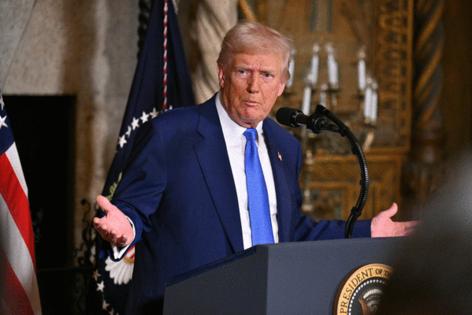Cynthia M. Allen: Trump's order on IVF could alienate Catholic supporters
Published in Op Eds
Trump gives, and Trump takes away.
That is the sentiment felt by many conservative Catholics after the president announced an executive order intended to expand access to in vitro fertilization, or IVF.
Catholics came out in droves to support Trump in November, breaking for the president by as much as 20 percentage points, according to one exit poll.
In his early weeks in office, conservative Catholics in particular have been delighted by many of Trump’s policy initiatives — from outlawing gender transition surgeries on minors to affirming that biological females be the only ones allowed to compete in women’s sports (although 80% of the population supported the latter).
Even Trump’s and Vice President JD Vance’s scuffle with the U.S Conference of Catholic Bishops over immigration policy and refugee programs hasn’t been universally negative for all practicing Catholics, many of whom opposed the open border policies of the Biden administration, and some of whom suspect the bishops’ interest in the matter to be self-serving.
But to some pro-life Catholics, especially those who stood by Trump even as he eased away from the Supreme Court’s consequential Dobbs ruling returning abortion law to the states, his unfettered support for IVF feels like a betrayal.
“It’s a Big Pharma bandaid, with major ethical issues, like millions of frozen & destroyed embryos,” Lila Rose, founder of pro-life organization Live Action, wrote on X. “If we want to Make America Healthy Again, we should invest in addressing and healing the underlying causes of infertility.”
Her point is well-made because IVF doesn’t address or correct the sometimes serious health conditions that may cause infertility. It merely circumvents them.
But it does sometimes result in babies, which is probably why it has been widely accepted as an unmitigated good.
The Catholic Church, however, and many of its faithful have expressed compunction with a practice they find morally fraught.
Bishop Michael F. Burbidge of Arlington, Virginia, whose diocese is just outside of Washington, D.C., wrote in response to the White House action that “IVF is incompatible with the president’s evident support for the good of human life and his desire to encourage family formation.”
Indeed, contrary to Trump’s apparent notion that improved access to IVF will help quell the baby bust and grow more families, Lyman Stone of the Pronatalism Initiative at the Institute for Family Studies says that IVF tends to cause people to delay fertility, ultimately resulting in smaller families.
However, the crux of the church’s greatest concern with IVF is thus: “For every one of the more than 12 million children born by means of IVF since 1978, there are many tens of millions more missing brothers and sisters who have been either deliberately destroyed, experimented upon, or frozen in liquid nitrogen and denied their natural right to the fullness of their development,” Burbridge wrote.
For as many lives as IVF creates, an exponentially greater number are destroyed.
Individuals or couples who pursue IVF, a medical procedure during which human eggs and sperm are united outside their respective bodies and then placed inside a woman’s uterus to develop, frequently create more embryos than they can use.
Those that are never implanted languish in clinic freezers or perish in laboratories, the fact of their existence often an afterthought for parents who successfully created a family sized to their liking.
Other embryos (or eggs and sperm) are literally bought and sold in what is arguably a human market — all part of an industry that largely unregulated and ripe for negligence and abuse.
It was one such incidence of negligence that first brought IVF to the president’s attention.
About this time last year, the Alabama Supreme Court found that the state’s wrongful death statute applied to extrauterine children (embryos killed as a consequence of negligence outside of a biological uterus) were still protected under the law, and those who caused their demise were liable for their actions.
The decision was widely and irresponsibly misinterpreted to have “banned IVF” for theological reasons — what political opportunists and a complacent media assumed to be an anticipated consequence of the Dobbs decision and Trump’s extremist pro-life supporters.
Seeking to assuage the controversy, Trump promised to support IVF if elected; his latest action is viewed as a promise fulfilled.
Most Catholics have friends who have become parents on its account and love their children as they would any other.
Still, the ethical questions surrounding the way in which IVF is regulated (or not regulated) make the issue politically and morally thorny, to say the least.
To be sure, the order has no immediate impact but merely recognizes the financial burden IVF places on families and calls for the development of policy recommendations to reduce it.
To what degree Trump supports the procedure remains to be seen.
But if his first month in office is any indication, Trump will probably make good on it, and that will be hard for many of his staunchest Catholic supporters.
___
©2025 Fort Worth Star-Telegram. Visit at star-telegram.com Distributed by Tribune Content Agency, LLC.




























































Comments